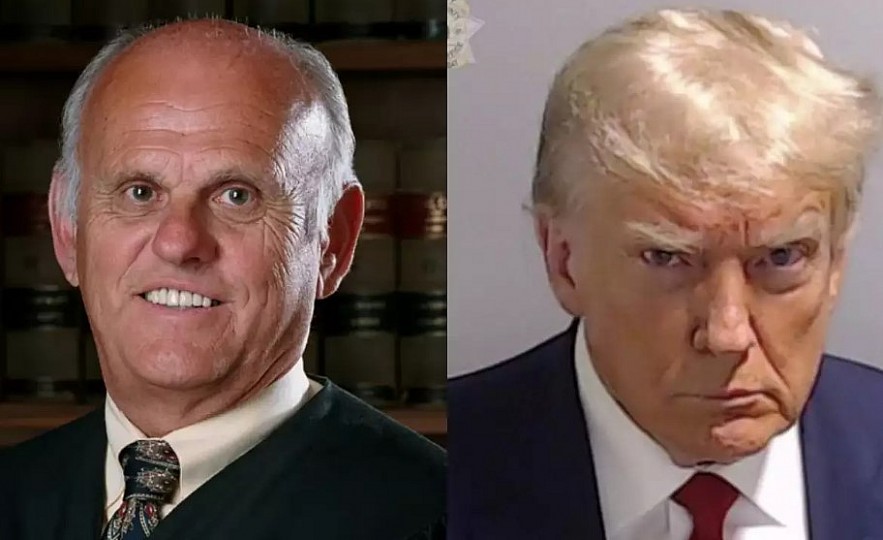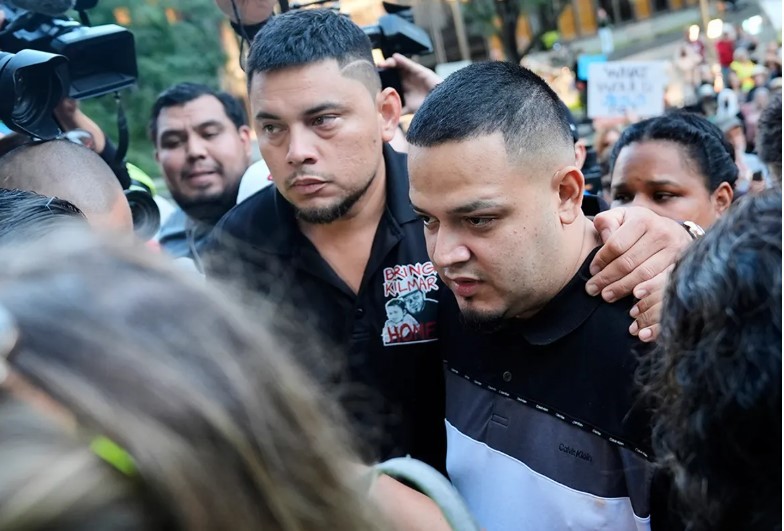Who Is Judge John C. Coughenour — The Man Who Stood in Trump's Way on Birthright Citizenship?
 Understanding American Birthright Citizenship: History, Impact, and Controversies Understanding American Birthright Citizenship: History, Impact, and Controversies |
 Does a Child Born in the U.S. Automatically Gain U.S. Citizenship and a Passport? Does a Child Born in the U.S. Automatically Gain U.S. Citizenship and a Passport? |
Supreme Court Clears Path for Trump-Era Push to Curb Birthright Citizenship
The U.S. Supreme Court delivered a major victory to the Trump administration on Friday, ruling 6-3 in favor of allowing its plan to restrict automatic birthright citizenship to move forward in part. The decision centers not directly on the policy itself, but on the limits of judicial power—specifically, nationwide injunctions. The Court ruled that such injunctions issued by lower courts should only apply to the specific plaintiffs involved in a case, not the entire country.
This effectively lifts broad legal barriers that had stalled the administration's controversial proposal, allowing implementation in states that didn’t sue to block it. While the core legal battle over the constitutionality of ending birthright citizenship is far from over, this ruling clears a path for partial rollout. Critics argue the move threatens the long-standing interpretation of the 14th Amendment, which guarantees citizenship to all born on U.S. soil. Supporters claim the shift is necessary to address immigration abuses.
The decision reflects the Court’s ongoing skepticism toward sweeping judicial orders and marks a strategic legal boost for Trump-era immigration reforms, many of which have been repeatedly challenged in court.
Who Is John C. Coughenour?
Judge John C. Coughenour is a highly respected Senior United States District Judge for the Western District of Washington, who has played a pivotal role in shaping judicial precedent in the United States.
His recent ruling to block former President Donald Trump’s executive order aimed at ending birthright citizenship has once again brought him into the spotlight.
This article explores his background, career, and the significant impact of his judicial decisions.
 |
| John C Coughenour Blocks Trump's Executive Order Ending Birthright Citizenship |
Early Life and Education
John Clare Coughenour was born on July 27, 1941, in Pittsburg, Kansas. Growing up in the heartland of America, he developed a strong sense of fairness and justice, qualities that would later define his judicial career.
He attended Pittsburg State University, where he earned a Bachelor of Science degree in 1963. His passion for law and justice led him to the University of Iowa College of Law, where he received his Juris Doctor in 1966.
Legal Career Before Becoming a Federal Judge
After completing law school, Coughenour began practicing law in Seattle, Washington. He quickly established himself as a skilled litigator with a reputation for fairness and integrity. From 1970 to 1973, he served as an assistant professor at the University of Washington School of Law, where he taught trial and appellate practices. During this time, he influenced many young legal minds, emphasizing the importance of ethical advocacy and the rule of law.
Coughenour also became a litigation partner at the prestigious law firm Bogle & Gates in Seattle. His experience in private practice honed his legal skills and prepared him for the responsibilities of the federal bench.
Federal Judicial Appointment
In 1981, President Ronald Reagan nominated John C. Coughenour to the United States District Court for the Western District of Washington. This nomination filled the vacancy left by Judge Morell E. Sharp. On September 25, 1981, the U.S. Senate confirmed Coughenour's appointment, and he officially took office on September 28, 1981.
During his tenure, Judge Coughenour served as Chief Judge from 1997 to 2004. He assumed senior status on July 27, 2006, allowing him to continue hearing cases while reducing his administrative responsibilities. Over the years, he has developed a reputation for his meticulous approach to the law, unwavering commitment to constitutional principles, and fairness in the courtroom.
 President Trump to End U.S. Birthright Citizenship for Children of Illegal Immigrants President Trump to End U.S. Birthright Citizenship for Children of Illegal Immigrants |
 Which American Citizens Could Be Deported Under Trump’s Orders? Which American Citizens Could Be Deported Under Trump’s Orders? |
Notable Cases
Ruling on National Security Cases
Judge Coughenour has presided over several high-profile national security cases. One of his most notable rulings was his decision to sentence Ahmed Ressam, the so-called "Millennium Bomber," to 22 years in prison. Ressam had plotted to bomb Los Angeles International Airport on New Year's Eve in 1999. During the sentencing, Coughenour used the opportunity to emphasize the importance of adhering to the rule of law, even when dealing with terrorism. He stated, “We do not need to use a secret military tribunal, detain the defendant indefinitely, or deny him the right to counsel. The message to the world from today’s sentencing is that our courts work.”
Landmark Environmental Decisions
Coughenour has also made significant rulings on environmental issues, often holding corporations accountable for violating environmental laws. His decisions have been praised by environmental advocates for prioritizing sustainability and the public’s health.
Blocking Trump’s Executive Order on Birthright Citizenship
In January 2025, Judge Coughenour issued a temporary restraining order blocking Donald Trump’s executive order that aimed to end birthright citizenship in the United States. The executive order sought to deny citizenship to children born in the U.S. to parents who were neither citizens nor lawful permanent residents.
Coughenour’s ruling was grounded in the 14th Amendment of the U.S. Constitution, which states: “All persons born or naturalized in the United States, and subject to the jurisdiction thereof, are citizens of the United States and of the state wherein they reside.” His decision highlighted the fundamental importance of this constitutional guarantee, which has been a cornerstone of American citizenship law since its ratification in 1868.
In his opinion, Coughenour wrote, “The executive order in question is a direct violation of the Constitution and the values it enshrines. It disregards nearly 160 years of legal precedent and would undermine the very fabric of equal rights in this country.” The ruling was widely celebrated by immigration advocates, legal scholars, and civil rights organizations as a critical defense of constitutional principles.
Judicial Philosophy
Judge Coughenour is known for his thoughtful and measured approach to the law. He believes in the importance of an independent judiciary and the role of courts in safeguarding constitutional rights. Throughout his career, he has consistently emphasized the need for fairness, transparency, and adherence to the rule of law.
Coughenour’s sentencing philosophy often reflects his belief in the potential for rehabilitation. He has been recognized for his compassionate treatment of defendants, particularly those who show genuine remorse and a willingness to change.
Personal Life and Legacy
Despite his prominence, Judge Coughenour has maintained a low profile when it comes to his personal life. He is known to value his privacy, and details about his family and personal assets are not widely available. His focus has always been on his work and his contribution to the justice system.
Coughenour’s legacy is one of integrity, fairness, and dedication to upholding the Constitution. His rulings have had a profound impact on both national and local issues, and his recent decision to block the executive order on birthright citizenship is a testament to his unwavering commitment to justice.
Conclusion
Judge John C. Coughenour’s career is a shining example of what it means to serve with integrity and dedication in the judiciary. His decisions, particularly those involving constitutional rights and national security, demonstrate his deep understanding of the law and his commitment to ensuring justice for all. By blocking Trump’s executive order on birthright citizenship, he reaffirmed the enduring importance of the 14th Amendment and the principles it protects.
As Judge Coughenour continues to serve on the federal bench, his work remains a beacon of hope for those who believe in the power of the judiciary to uphold the rule of law.
 Fact-Check: U.S Constitution Removed From White House Website Fact-Check: U.S Constitution Removed From White House Website Fact-Check: Was the U.S. Constitution Removed from the White House Website After President Trump’s Inauguration? |
 The Full Text: Joe Biden's Outgoing Letter to Donald Trump The Full Text: Joe Biden's Outgoing Letter to Donald Trump In his final letter to President Donald Trump, former President Joe Biden wished him "may God bless you and guide you" before leaving the Oval ... |
 What Might the Assassination Files Reveal? Trump Orders Release of JFK, RFK and MLK Records What Might the Assassination Files Reveal? Trump Orders Release of JFK, RFK and MLK Records Long-secret documents pertaining to the murders of President John F. Kennedy, his brother Robert F. Kennedy, and civil rights activist Martin Luther King Jr. were ... |
 Behind the Trump vs. Bank of America and JP Morgan Clash Behind the Trump vs. Bank of America and JP Morgan Clash We will explore the roots of this conflict, analyze the responses from Bank of America and JP Morgan, and examine the broader implications for politics, ... |























